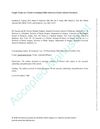 January 2009 in “Hair transplant forum international”
January 2009 in “Hair transplant forum international” Dr. Rodney Sinclair uses a detailed grading system to diagnose female pattern hair loss, recommends daily spironolactone and minoxidil for treatment, and believes genetics play a role in the condition.
 139 citations,
October 1999 in “Environmental Health Perspectives”
139 citations,
October 1999 in “Environmental Health Perspectives” Modern science supports the use of some Ayurvedic plants for health, as ancient practices suggested.
 39 citations,
December 2018 in “Methods in molecular biology”
39 citations,
December 2018 in “Methods in molecular biology” The document concludes that computational methods using networks and various data can improve the process of finding new uses for existing drugs.
[object Object] June 2013 in “The mental health clinician” Large data can lead to new medical discoveries and personalized medicine.
 December 2023 in “JEADV. Journal of the European Academy of Dermatology and Venereology/Journal of the European Academy of Dermatology and Venereology”
December 2023 in “JEADV. Journal of the European Academy of Dermatology and Venereology/Journal of the European Academy of Dermatology and Venereology” Many women in Turkey have hirsutism, according to the research group's findings.
November 2019 in “SLAS technology” New findings suggest certain genes and microRNAs are crucial for wound healing, and innovative technologies like smart bandages and apps show promise in improving treatment.
 37 citations,
October 2015 in “European Journal of Human Genetics”
37 citations,
October 2015 in “European Journal of Human Genetics” Genetic data can predict male-pattern baldness with moderate accuracy, especially for early-onset cases in some European men.
[object Object] 7 citations,
March 2021 in “IntechOpen eBooks” RF energy is used in medical and beauty treatments to heat tissues, tighten skin, and reduce fat safely.
 2 citations,
May 2024 in “Journal of science and medicine in sport”
2 citations,
May 2024 in “Journal of science and medicine in sport” Exercise is crucial for managing polycystic ovary syndrome (PCOS) and improving overall health.
 November 2022 in “Scientific Data”
November 2022 in “Scientific Data” The research identified genes and non-coding RNAs in cells that could be affected by testosterone, which may help understand hair loss and prostate cancer.
 82 citations,
September 2011 in “Quality of Life Research”
82 citations,
September 2011 in “Quality of Life Research” Choosing the right recall period for patient feedback is important for accurate data and depends on the disease, symptom changes, and patient impact.
 53 citations,
October 2018 in “Aesthetic Surgery Journal”
53 citations,
October 2018 in “Aesthetic Surgery Journal” Google Trends data on facial cosmetic procedures matches actual surgery numbers, showing it can help plastic surgeons understand public interest.
 23 citations,
January 2021 in “Journal of Dermatological Science”
23 citations,
January 2021 in “Journal of Dermatological Science” The document concludes that we need more research to understand Telogen Effluvium and find effective treatments.
 July 2023 in “International Journal of Cosmetic Science”
July 2023 in “International Journal of Cosmetic Science” Biopolymers are increasingly used in cosmetics for their non-toxicity and skin benefits, with future biotech advancements likely to expand their applications.
 September 2018 in “Journal of The American Academy of Dermatology”
September 2018 in “Journal of The American Academy of Dermatology” Lichen planopilaris patients often have other health conditions too.
 18 citations,
June 2019 in “Twin research and human genetics”
18 citations,
June 2019 in “Twin research and human genetics” The 25Up study collected extensive data on mental disorders and related factors in Australian twins and siblings to investigate the genetics of psychiatric illnesses.
 3 citations,
January 2020 in “Plastic and Aesthetic Research”
3 citations,
January 2020 in “Plastic and Aesthetic Research” Non-surgical procedures can help reduce wrinkles and stimulate skin repair by understanding skin aging at the molecular level.
 June 2023 in “Dermatology and therapy”
June 2023 in “Dermatology and therapy” The Middle East and Africa need better data, treatment consensus, and support for Alopecia Areata.
 August 2024 in “Archives of Dermatological Research”
August 2024 in “Archives of Dermatological Research” Certain genetic variants and pathways are linked to hair loss.
 May 2021 in “medical journal of mashhad university of medical sciences”
May 2021 in “medical journal of mashhad university of medical sciences” The mix of 2% flutamide and 5% minoxidil improves hair thickness more than just 5% minoxidil alone in treating hair loss.
 68 citations,
January 2007 in “Journal of Cosmetic and Laser Therapy”
68 citations,
January 2007 in “Journal of Cosmetic and Laser Therapy” Laser/light treatments for hair loss are popular but lack scientific data proving effectiveness.
 12 citations,
January 2008 in “Drugs”
12 citations,
January 2008 in “Drugs” Some topical treatments like corticosteroids and vitamin D analogues are effective for scalp psoriasis, but more long-term data is needed.

The research found that people's hair proteins vary, especially by ethnicity and body part, which could help identify individuals in forensic science.
 April 2019 in “Journal of Investigative Dermatology”
April 2019 in “Journal of Investigative Dermatology” Merkel cell carcinoma is most likely to recur within two years of diagnosis, and factors like immune suppression, being over 75, and male sex increase this risk.
February 2020 in “Pharmacoepidemiology and Drug Safety” Finasteride users have higher odds of certain health issues and lower odds of specific lifestyle factors compared to nonusers.
 151 citations,
May 2021 in “Frontiers in Medicine”
151 citations,
May 2021 in “Frontiers in Medicine” Many patients experience long-lasting symptoms like fatigue and pain after COVID-19, regardless of initial disease severity.
 85 citations,
June 2015 in “Scientific Reports”
85 citations,
June 2015 in “Scientific Reports” The study found that diseases can be grouped by symptoms and that the accuracy of predicting disease-related genes varies with the data source.
 56 citations,
March 2016 in “International Wound Journal”
56 citations,
March 2016 in “International Wound Journal” Skin grafts are effective for chronic leg ulcers, especially autologous split-thickness grafts for venous ulcers, but more data is needed for diabetic ulcers.
 7 citations,
March 2019 in “Cancer Epidemiology, Biomarkers & Prevention”
7 citations,
March 2019 in “Cancer Epidemiology, Biomarkers & Prevention” Finasteride use is not clearly linked to an increased risk of male breast cancer.
 6 citations,
February 2023 in “Advances in Therapy”
6 citations,
February 2023 in “Advances in Therapy” Baricitinib, a drug for rheumatoid arthritis, atopic dermatitis, and alopecia areata, is generally safe with low risk of major side effects, even in patients with risk factors. It's also effective in promoting hair regrowth in alopecia areata patients.

























